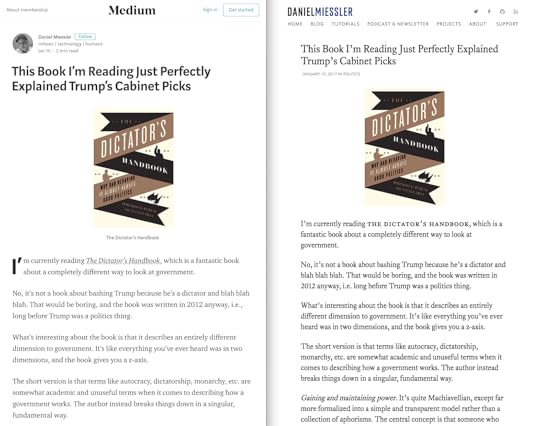Daniel Miessler's Blog, page 113
October 18, 2017
How I Would Build my Life If I Could Engineer It From Scratch

I like to periodically think about long-term goals and whether or not I’m moving towards them. One idea that I stumble into every once in a while related to that is the the question of an ideal life.
If I could script my own path, from the very beginning, what would I want it to look like? It turns out to be pretty revealing to honestly explore this question, and I thought—why not do it in public?
Here’s my current list, which I think I’ll keep updated as a project:
For an undergraduate degree, I would do Politics, Philosophy, and Economics at Oxford. The more I read the more I realize how crucial both economics are as a foundation for education, and Oxford is the first school to offer the degree.
I’d run a website pretty much exactly like this one and use it as the homebase for all my projects.
I’d travel around the world speaking on technology and humanity.
I’d own a book store, and it would be the most aesthetically beautiful bookstore you could imagine. From the name of the store, to the typography on the sign outside, to the menu of coffee, to the book selection, it would be exquisitely curated and thought-out. There would be relatively few books, but every single one would be a treasure, and when not traveling I’d spend time there getting people excited about reading.
I’d also be doing additional degree programs, such as the custom liberal college programs where you don’t pick anything and they just run you through this curated set of courses.
Now for the fun part. The trick move is to look at the list, and look at your own life, and ask yourself:
What part of this list can I not do?
It’s really an exercise in not becoming complacent and assuming that life is over because you’re over 25.
And even if there are things on your own list that just aren’t realistic, like getting accepted to Oxford for example, how can you check that box in other ways? Could you find the curriculum? Could you find all the books that are read in those courses and read them yourself? Could you find the syllabus for those classes?
In many cases the answer might be yes—regardless of what the item is.
I encourage you to make your own perfect life list, and then start working on how to make it happen to whatever degree possible.
Support
If you enjoy or get value from the content, please consider helping to support it through membership.
Membership ($10/month)
Membership ($100/year)
Thank you,
Daniel
Personal Sensors Are the Next Breakthrough in Consumer Electronics

I’ve thought for a while now that the next big leap in consumer electronics will be personal sensors, meaning—most importantly—video and audio.
If people were just recording video and audio while they walked around, that might have some sort of utility, but probably not much. It’d be more effort than it was worth to sift through the content and find something interesting.
The actual breakthrough will be when people are wearing these sensors and the data from the sensors are being parsed by computers.
Imagine that you’re able to constantly record just video and audio, in all directions, as you walk around during your day. Forget how that’ll happen—it’ll likely be some sort of button or sticker, or other wearable item—but just assume that we can capture the data.
Now imagine a decent set of machine learning algorithms on the other side of the sensor, both at the edge and in the cloud, that are processing the data in realtime. What kinds of functionality will come from this?
Realtime language translation.
Notifications if someone is looking at you or talking about you.
Notifications when someone around you is talking about something dangerous.
An alert if there is an incoming car or bicycle you might not see.
An alert if someone has been following you for blocks without you knowing.
A ping for if a friend’s voice is heard, or their face is seen, in a crowd.
A ping if someone in the coffee shop is famous or popular in some way, or if they share common interests with you.
Various statistics for a given time period, e.g., how many men vs. women you passed on the street, how many cars went by, how many Android vs. iPhone devices are in this coffee shop.
How many calories you ate. (it can see all your food)
How many calories you burned (it can watch you exercise)
How much sleep you got (when you turned it off and turned it back on, plus other measurements).
How many times you talked to your friends and family vs. strangers, etc.
Take pictures of any scene using a voice command.
Get 360 degree images of places.
Based on your excitement level (accelerometer data, heart rate, etc.), automatically capture video or audio and pipe it to certain people, companies, or organizations. Imagine crashes, or robberies, or health issues.
These are just a few I thought up in a minute or two. There will be thousands of use cases, created by hundreds of companies. Some companies will be great at identifying objects. Others will be good at voice. Others will be good at situations and scenes, etc.
And all of this will filter through your personal operating system so that the insights that are gained are passed on to the rest of your personal platform—at home, in the car, and at work.

Sensors connected to machine learning algorithms are powerful. Especially when you have video and audio. But the true power of this combination will come when we’re wearing those sensors and the observations, notifications, and alerts produced by the algorithms are uniquely valuable to us as individuals.
That’s when the market will explode.
Then there’s a whole separate industry that will rise up around the interfaces for presenting this data to the person. It’ll start with AirPods and Buds, i.e., voice prompts because they’re the first hands-free interface we’ll have. The next breakthrough will be a usable visual interface that is hands-free, meaning glasses.
Lots of other tech is interesting right now, but this is the major bump I’m waiting for.
Notes
I wrote about lifecasting back in 2008, but I had no idea then about computers parsing the input from the streaming. It’s quite entertaining to read that piece now. Still lots of good stuff in there, but the assumption was human services would be used to parse the content.
By the way, I’m not saying this is “next” as in coming immediately. I mean it’s the next big thing, at least that I care about.
There are a lot of similarities between this and Universal Daemonization, which I wrote about in my book. The difference is that this is parsing light and sound, where UD requires the daemon infrastructure.
Support
If you enjoy or get value from the content, please consider helping to support it through membership.
Membership ($10/month)
Membership ($100/year)
Thank you,
Daniel
October 17, 2017
Why I Call Myself an Atheist Instead of an Agnostic

There is much debate in the non-religious community about the word atheist. Is it too strong? Does it do harm? Can anyone really be sure enough to be atheist vs. being agnostic? Etc.
I think I have a very simple way of describing why atheism is the right word for not believing in god, and why agnosticism is the wrong word. Let’s start with three basic statements.
Atheist means a lack of belief, not certainty against a belief.
Agnosticism is the belief that the existence or non-existence of God is unknowable.
Agnosticism, in a scientific context, means you don’t yet have enough information, and that you’re waiting to make up your mind when that time comes. For example, one might be agnostic about what precise event killed the dinosaurs.
Consider these three together and ask yourself a simple question:
Are you agnostic about leprechauns?
Seriously. If someone were to ask you if leprechauns existed would you be tempted to say:
Well, who’s to say? Who really knows? Nobody can be 100% certain, so I guess I’m agnostic on them.
No. Smart people aren’t agnostic about leprechauns; they’re leprechaun atheists.

The reason for this is that they heard the claim that leprechauns existed and rejected it due to insufficient evidence. You should do the same for a man from Nazareth who’s the son of God, who’s also God, who died for your sins, but isn’t actually dead.
Leprechauns and God both have equally bad evidence for them.
Agnostics know this, and that’s why they aren’t religious. But they’ve failed to see that it’s ok to just reject such ideas instead of respecting them like scientific knowledge we don’t have yet.
It also quite interesting that the world doesn’t mind being an atheist towards Osiris, Thor, Zeus, and tens of thousands of other gods that were worshiped for millennia.
In short, if you’re not agnostic about Leprechauns, you shouldn’t be agnostic about God either.
It’s ok to reject claims that have no evidence. You don’t have to be agnostic about every silly thing that someone dreams up. And that’s what all gods have been—including the last remaining few that people still believe in.
Have the intellectual courage to take the last step.
Notes
This piece is written for agnostics, not for believers. I believe it’s fine to be an obnoxious atheist in your 20’s but it’s plain rude to be one in your 30’s or beyond. I have no interest, and don’t see the benefit of, trying to change the minds of mind-your-own-business believers. This post is for people who already don’t believe but just haven’t taken the final step.
_
If you enjoyed this, you can explore my other content, subscribe to my newsletter, and/or show support for my work.
Why I Call Myself a Feminist

A reader emailed me recently commenting on something I wrote about feminism and said the following:
Wanting what you and I want doesnt make us feminists, it makes us decent human beings.
He has a point, of course, but I see it a bit differently. Here was my response:
I think the issue is that these things combine when there is a need for them to. As an example, if I were alive during slavery I’d hope I were an abolishinist.
Once could say, “I don’t call myself an abolishinist; that’s just being a decent human being.” But when there’s a war going on it matters which side you take. And the side against slavery is the abolishinist side.
I see the same thing happening with feminism. It’s nowhere near as bad, of course, but it’s the same type of thing. I don’t identify primarily as a feminist—meaning it’s not the central theme in my life—but I do identify as one because that side needs soldiers.
I identify as an atheist in the same way and for the same reason, i.e., to oppose harm being done in the name of the opposite.
If women were treated equally and there were no religion I would be neither a feminist or an atheist, because I wouldn’t need to be.
But that’s not the world we live in.
The shorter answer, I suppose, is that I’m a feminist because feminists are needed. That’s usually the case with “ists”. Labels, in this context, are used to raise awareness regarding a type of oppression. And those who use the label are—by adopting it—both acknowledging the problem and declaring that they oppose it. And on the whole I think that’s a good thing.
When there’s nothing to be “ist” about anymore I’ll happily stop using designations that are redundant with being a good person.
But it might be a while.
Notes
A commonly raised issue is that feminism and atheism often get saddled down with negative connotations and become more harmful than helpful. This is true, but the great thing about language is that you can use it differently at different times. If the label of feminist would trigger someone and take us down a fruitless or negative path, then I’ll just say the same thing a different way. And if it would help, I’ll use the term. So I don’t think this is as big a problem as many seem to.
_
If you enjoyed this, you can explore my other content, subscribe to my newsletter, and/or show support for my work.
October 16, 2017
Unsupervised Learning: No. 97
This is episode No. 97 of Unsupervised Learning—a weekly show where I curate 3-5 hours of reading in infosec, technology, and humans into a 30 minute summary. The goal is to catch you up on current events, tell you about the best content from the week, and hopefully give you something to think about as well…
This week’s topics: Major WPA2 Flaw, Suburu hack, Vulnerable Container Ships, F-35 Data Stolen, Accenture S3 Buckets, tech news, human news, ideas, discovery, recommendations, aphorism, and more…
Listen and subscribe via…



Read below for this episode’s show notes & newsletter, and get previous editions…
InfoSec news
It looks like WPA2 might be broken in some major way, with a vulnerability name of KRACK for Key Reinstallation Attack, and the full paper is going to be released soon. The upshot seems to be people eavesdropping on your wireless traffic and extracting the data, even if you’re using WPA2. Expect this to be a favorite vulnerability for a long time, keeping in mind that TLS still helps significantly. Link
A vulnerability in Suburu key fobs allows an attacker to steal vehicles and lock out the owner due to the use of predictable codes. The researcher, Tom Wimmenhove, also showed how to build the car stealing device, which costs around $25 to make. Link
Container ships are basically floating ICS systems connected to the internet, and one researcher has found a bunch of them on Shodan and says they often use default and weak credentials. Link
The DoD has confirmed that an Australian defense firm was hacked, and the attackers stole classified data on the F-35 fighter jet. They evidently popped a public-facing server and used shared credentials to move laterally once inside. The malware used was called China Chopper, which has been used by Chinese hackers in the past. Link
Accenture got caught with their S3 buckets down, and disclosed a bunch of sensitive keys, credentials, and customer data, including up to 40,000 plaintext passwords that might belong to Accenture customers. At this point these stories are producing a nervous laughing/weeping. It’s like we know exactly what the problem is but people still aren’t seeing if they have it. Link
Hyatt hotels has had its second breach in 2 years. They said their cybersecurity team discovered signs of unauthorized access of payment information of certain Hyatt-managed locations. I’d tell you to change your credit cards, but it really wouldn’t matter. This is the new normal. Link
Google is nerfing their Home Minis because they were deployed in an “always listen” mode and someone figured it out and went public about it. I can’t imagine Amazon or Apple making this mistake, but I could imagine from Facebook and Google. This is why I won’t be deploying any of their home assistant technology anytime soon. Link
Forrester had a data breach on its website allowing attackers to steal the content it provides to its customers. The PR release was quite nimble. Link
Lockheed Martin, Boeing, Raytheon, and Northrop Grumman all lack HTTPS on their main websites. Ridiculous. Link
Patching: October Windows Security Updates, , WPA2, Flash
Technology news
The MICrONS project, conducted through Baylor, CMU, Harvard, and Princeton and IARPA, are looking to spend $100 million to reverse engineer the brain once and for all. Link
Alibaba is doubling its R&D spend to $5 billion, but that’s less than a third of what Amazon is spending. Fear Amazon. I don’t care if you make toilet paper or airplanes—be afraid of anyone spending more than $15 billion on R&D who’s willing to fail and is shipping products. Link
Bitcoin has topped $5,700. Link
Human news
My 3 Essential Podcasts

I listen to a lot of audio, both in my car and while just walking about, and I split my time as around 2/3 audiobooks and 1/3 podcasts. There are probably around 10 total podcasts that I listen to, but there are 3 that I try to never miss.
1. Riskybusiness, by Patrick Gray

Patrick Gray in his studio
Risky Business is an information security podcast by Patrick Gray, and it’s really quite phenomenal. Patrick is very sharp, he has unbelievable integrity, and he runs an extremely well-produced podcast that never gets dull. It’s my one go-to security podcast (if you don’t count the one I create myself).
2. a16z, by YCombinator

a16z is a brilliant podcast that centers around emerging technologies and the trends surrounding them. It’s created by YCombinator, which is an investment group based in Silicon Valley, and the hosts and guests are just phenomenal. I hardly ever listen to an episode and don’t come away with a ton of new ideas and information.
3. Waking Up, by Sam Harris

Waking Up is a podcast by writer and neuroscientist Sam Harris. The format is the show is guest-based, and Sam has some of the best guests and topics you can ever imagine on the show. He basically talks about anything that’s of interest to him at the moment, including science, technology, religion, spirituality and happiness, and politics. I’ve corresponded with Sam for years on various topics and I believe him to be the most thoughtful and articulate intellectual alive right now. Highly recommended for anyone seeking an intellectual fix.
Basically, it’s Risky Business (and my own podcast) for infosec, a16z for emerging tech trends, and Waking Up for broad-base intellectual topics.
Those are the three I try to never miss, and I urge you to check them out as well.
_
If you enjoyed this, you can explore my other content, subscribe to my newsletter, and/or show support for my work.
October 15, 2017
Russia is Trying to Destroy America, and Here’s How They’ll Do It

image by Lionel smit
There is a lot of fallout around how Russia used Facebook, Twitter, and other social media networks to sow dissent within the U.S.—especially around election time—for the tactical aim of getting Trump elected.
At the time I thought this was because they wanted to make Trump a major enemy of the world, diminish America’s prominence as a world leader, and ultimately use our lowered position as a stepping stone to becoming a global leader themselves.
Basically, once we were lowered, they could say,
The world needs a leader, and we’re willing to play that role now that America has failed us.
But now I think that while that was a nice-to-have, the real game was far longer-term and more strategic.
The ads that were purchased and disseminated throughout social media were on the most divisive topics in our country right now, e.g., race, gender, guns, etc. They were purposely creating hate within the country. Hate from Americans to other Americans.
The biggest threat to Russia is a strong America, and the biggest threat to America is internal fragmentation.
America, being a country of immigration, has always been, and will always be, under the threat of losing its identity. If nobody knows what it means to be American, then the union has failed.
Countries cannot survive as a collection of other countries, or collections of other people. They have to be their own thing. Traditionally, America has been all about tolerance, unity, freedom of expression, and opportunity.
So how do you attack that?
You tell people that there is no opportunity, because they are taking it from you
You describe how horrible the other group is
You show how your group is being mistreated by everyone else, including the government and the other groups
You show how one groups incomes and prosperity is falling, while another groups’ is rising
This is how to destroy a country, and this is precisely the type of ads that were taken out by Russia.

image from Atlanta Star
Putin and his government are masters of information warfare, and this is exactly what we should expect from them. It’s a phenomenal plan, honestly, and it’ll probably work since nobody is paying attention.
But for the few who have their eyes open, this is the play. This is the plan. This is the strategy to defeat America.
Find all the different groups within America, find why they hate each other, and magnify or inject hatred from one side to the other. All they need is a giant platform on which to do this so that millions can see and share the hatred.
They have that in Facebook and Twitter. They have the perfect weapon to destroy us from within, and that’s exactly what they’re doing.
So don’t let this Facebook ad story leave your consciousness. It’s not about Facebook. It’s not about ads. It’s about a continuing fragmentation of America, and foreign enemies who are going to use technology to accelerate that outcome.
Our defense is to define what it means to be American in a cohesive and inclusive way, to join with all of our internal groups and say, “We are Americans, and we love each other, and nobody will ever take that away from us.”
But right now we aren’t that. We’re rich, we’re poor, we’re black, we’re white, we’re gay, we’re straight. Chinese immigrants don’t respect blacks or latinos, latino immigrants hate blacks, a massive percentage of whites in the midwest dislike minorities, and the distance between the rich and poor is expanding.
And nobody knows what it means to be American anymore. Go ask a large group of Chinese immigrants if they’re proud to be American. It’s a joke. They’re Chinese in America. Many first-generation latinos are also proudly Mexican, or Cuban, or whatever else they are. Not Americans. That doesn’t happen until the next generation, or the one after that.
But it might not happen anymore if the temperature in the pot is not high enough to melt previous loyalties.

And why should there be loyalties? We aren’t treating immigrants like we used to. We used to welcome them, give them opportunities, and celebrate their success. But we’re closing all opportunities now, even for people who’ve been here for many generations—let alone for new arrivals.
So we are fragmenting.
We are building small communities of people from other places. And they tend not to like the other communities of immigrants due to long-held racism. The only reason they’re not openly hostile and discriminatory towards each other is because of the strong unifying force of traditional America that said, “You’re in America now, and you’re not allowed to hate each other.”
But that’s what’s dying. That’s what we’re losing. We’re losing the unifying force that keeps one group tied to another. We’re losing the bond that makes us Americans.
And once it diminishes past a certain point, all the various factions are going to refuse to do anything that can be conceived as helping the other. Poor whites won’t want to pay for public transit because it’ll be used by “them”. Chinese immigrants won’t want public transit to come to their neighborhood because it’ll bring “them”. Blacks, latinos, whites, rich and poor—all at war with each other.
That’s how America ends—as a Balkanized set of self-interested groups fighting for resources.
And that’s what Russia is working to accelerate.
_
If you enjoyed this, you can explore my other content, subscribe to my newsletter, and/or show support for my work.
Russia is Trying to Destroy America, and Here’s How to Do It

image by Lionel smit
There is a lot of fallout around how Russia used Facebook, Twitter, and other social media networks to sow dissent within the U.S.—especially around election time—for the tactical aim of getting Trump elected.
At the time I thought this was because they wanted to make Trump a major enemy of the world, diminish America’s prominence as a world leader, and ultimately use our lowered position as a stepping stone to becoming a global leader themselves.
Basically, once we were lowered, they could say,
The world needs a leader, and we’re willing to play that role now that America has failed us.
But now I think that while that was a nice-to-have, the real game was far longer-term and more strategic.
The ads that were purchased and disseminated throughout social media were on the most divisive topics in our country right now, e.g., race, gender, guns, etc. They were purposely creating hate within the country. Hate from Americans to other Americans.
The biggest threat to Russia is a strong America, and the biggest threat to America is internal fragmentation.
America, being a country of immigration, has always been, and will always be, under the threat of losing its identity. If nobody knows what it means to be American, then the union has failed.
Countries cannot survive as a collection of other countries, or collections of other people. They have to be their own thing. Traditionally, America has been all about tolerance, unity, freedom of expression, and opportunity.
So how do you attack that?
You tell people that there is no opportunity, because they are taking it from you
You describe how horrible the other group is
You show how your group is being mistreated by everyone else, including the government and the other groups
You show how one groups incomes and prosperity is falling, while another groups’ is rising
This is how to destroy a country, and this is precisely the type of ads that were taken out by Russia.

image from Atlanta Star
Putin and his government are masters of information warfare, and this is exactly what we should expect from them. It’s a phenomenal plan, honestly, and it’ll probably work since nobody is paying attention.
But for the few who have their eyes open, this is the play. This is the plan. This is the strategy to defeat America.
Find all the different groups within America, find why they hate each other, and magnify or inject hatred from one side to the other. All they need is a giant platform on which to do this so that millions can see and share the hatred.
They have that in Facebook and Twitter. They have the perfect weapon to destroy us from within, and that’s exactly what they’re doing.
So don’t let this Facebook ad story leave your consciousness. It’s not about Facebook. It’s not about ads. It’s about a continuing fragmentation of America, and foreign enemies who are going to use technology to accelerate that outcome.
Our defense is to define what it means to be American in a cohesive and inclusive way, to join with all of our internal groups and say, “We are Americans, and we love each other, and nobody will ever take that away from us.”
But right now we aren’t that. We’re rich, we’re poor, we’re black, we’re white, we’re gay, we’re straight. Chinese immigrants don’t respect blacks or latinos, latino immigrants hate blacks, a massive percentage of whites in the midwest dislike minorities, and the distance between the rich and poor is expanding.
And nobody knows what it means to be American anymore. Go ask a large group of Chinese immigrants if they’re proud to be American. It’s a joke. They’re Chinese in America. Many first-generation latinos are also proudly Mexican, or Cuban, or whatever else they are. Not Americans. That doesn’t happen until the next generation, or the one after that.
But it might not happen anymore if the temperature in the pot is not high enough to melt previous loyalties.

And why should there be loyalties? We aren’t treating immigrants like we used to. We used to welcome them, give them opportunities, and celebrate their success. But we’re closing all opportunities now, even for people who’ve been here for many generations—let alone for new arrivals.
So we are fragmenting.
We are building small communities of people from other places. And they tend not to like the other communities of immigrants due to long-held racism. The only reason they’re not openly hostile and discriminatory towards each other is because of the strong unifying force of traditional America that said, “You’re in America now, and you’re not allowed to hate each other.”
But that’s what’s dying. That’s what we’re losing. We’re losing the unifying force that keeps one group tied to another. We’re losing the bond that makes us Americans.
And once it diminishes past a certain point, all the various factions are going to refuse to do anything that can be conceived as helping the other. Poor whites won’t want to pay for public transit because it’ll be used by “them”. Chinese immigrants won’t want public transit to come to their neighborhood because it’ll bring “them”. Blacks, latinos, whites, rich and poor—all at war with each other.
That’s how America ends—as a Balkanized set of self-interested groups fighting for resources.
And that’s what Russia is working to accelerate.
_
If you enjoyed this, you can explore my other content, subscribe to my newsletter, and/or show support for my work.
October 14, 2017
Medium is the Bud Light of Typography
I’ve been working on my new site design and was eager to show off my new typography, so I took a screenshot of the same content in Medium right next to the same content in my new site theme (see above).
Remarkably, and to my utter dismay, most people said they liked the left one because, “it was easier to read.”
I went through all the stages of grief.
These people are stupid!
I probably set up the screenshot wrong.
Many people have bad taste; and my site is for people who have good taste.
Shit.
Then I realized what could be happening.
Medium is banking on having every site have a similar look and feel, and they want that single look to be consumable.
Kind of reminds me of Bud Light.

Have you ever heard anyone who loves beer say that Bud Light is their favorite? Not many. But what’s easier to drink 12 of while you’re golfing—Bud Light or Guinness?
Right.
Guiness is more loved by people who love it, but hated by far more because it has character.
Medium decided to eschew character in their…well, characters. So what they have is plain, bland, and highly approachable. That’s one read on the whole thing.
But then I had an even scarier thought: What if my site design looks beautiful but isn’t functional? Isn’t that possible? A beautiful object that has a bad design?
Or, in other words, isn’t it possible for something to have a strong and attractive aesthetic while being hard to use?
Is that my problem?
Or is it that it’s more attractive and easier to read, but it’s still a designer beer and most people don’t like beer and prefer Bud Light?
And how much of a difference is there in that distinction?
All this bellybutton gazing has a purpose. If my site is beautiful but hard to read I’m going to change the typography. Nothing would disturb my internal peace more than creating something as a pinnacle of design that was hard to actually use.
But at the same time, if the new design just takes a moment to get used to and suddenly feels far more pleasant to the reader (like a good beer) then I’m absolutely going to stick with it.
Basically, anyone into typography would instantly prefer and respect the design, and people not used to it would come to love it within a few seconds.
The problem is that I don’t know which of these is true.
Halp.
_
If you enjoyed this, you can explore my other content, subscribe to my newsletter, and/or show support for my work.
October 13, 2017
It’s Time to Let Go of Our Data

Ancient textual relic
A long time ago, back when you had to go to your living room to use the telephone, there used to be public lists of everyone’s names, addresses, and phone numbers in something called a phone book. A few people asked not to be listed, but most just accepted it as understood that if someone wanted it, your data was out there.
It’s time now to accept this same thing with regard to our social security numbers, dates of birth, and other personal data.
Equifax was hacked, and it contained all this data about hundreds of millions of us, and more. OPM was hacked, and that data contained the sensitive private information for most people in the U.S. that hold a security clearance. The IRS has been hacked. The phone companies. Our banks. The restaurants. Basically every type of business that we regularly use has had our data stolen from it.
Criminal groups and foreign governments are aggregating this data so that it can be used for various purposes. Identity theft, spam, extortion, etc. You can think of it as one big database of everyone’s data in the world, with these different groups having different versions and copies of the database. And most of our data is in it.
But we can’t change our social security numbers or our dates of birth.
So what are we supposed to do?

The first thing to do is stop panicking every time your data is leaked. It’s out there. It’s done. The pee cannot be taken out of the pool.
Do what you can to defend yourself using credit freezes and continuous credit monitoring. Watch your accounts closely, rotate your credit cards when they get breached, and try to use things like Apple Pay to avoid sending credit card data in the first place.
That’s the first thing—just realize it’s going to happen and build a system for dealing with this reality.

Image from protectimus
But more importantly—as a society—we need to come up with a better way to authenticate ourselves and authorize transactions.
Because so many people have our information, and we can’t really change that information, we can no longer authorize transactions based only on having that data. It’s pretty obvious when you think about it.
What we’re going to have to do is some sort of composite authentication, where you have multiple factors in place at once, and at least one of those will likely include a live visual component.
Expect in-person authentication to become a lot more popular in coming years, with services like notaries getting used more frequently. And as the technology becomes available, expect to see digital forms of in-person identity validation as well—things like proving you’re at a particular location, doing bio-based auth, someone not validating that you are you unless they can see you and talk to you, etc.
These will be big changes to how things are done, but they will happen simply because they’ll have to.
Our private data has been stolen, and it’s no longer a solid foundation for authorizing transactions.
Let’s get ready for authentication based on multiple factors, with the most important addition being visual and audible validation of your person.
_
If you enjoyed this, you can explore my other content, subscribe to my newsletter, and/or show support for my work.
Daniel Miessler's Blog
- Daniel Miessler's profile
- 18 followers




